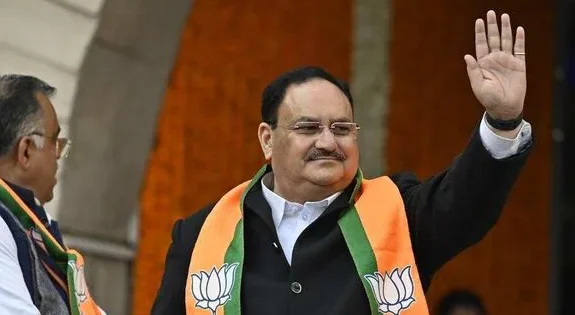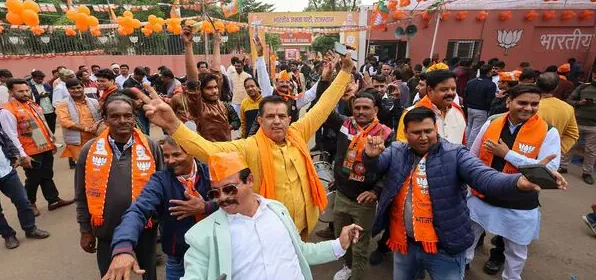BJP Begins Process to Elect New Party President with Appointment of National Returning Officer
The Bharatiya Janata Party (BJP) has officially initiated the process of electing its new party president by appointing K Laxman as the national returning officer. This appointment marks the beginning of a critical phase for the party’s organizational elections, leading up to the selection of a new national leader. BJP President J P Nadda made this announcement, also naming three co-returning officers: Naresh Bansal, Rekha Verma, and Sambit Patra. This team will play a central role in ensuring that the elections are conducted smoothly and according to the party’s constitution.
Responsibilities of the Election Team
The newly appointed team of returning officers has a vital role in managing the electoral process. They are tasked with developing a clear framework for conducting the elections as per the party’s guidelines. Their responsibilities include deciding the structure of the election process, selecting election officers for each state, and making sure that all protocols are followed. This meticulous approach helps guarantee a fair and transparent election, reflecting the BJP’s commitment to maintaining a structured internal democracy.
Also Read: Trucking Injuries Attorney Houston: Seeking Justice After an Accident
Roadmap for Organizational Elections
The BJP is currently in the final stages of a large-scale membership drive, which is expected to conclude within the next 15 days. Once this drive is complete, the party will begin the process of holding organizational elections. These elections will start at the local level, with party members electing representatives for local committees. The process then moves up the ladder to the mandal (block), district, regional, and state levels. This multi-tiered electoral structure ensures that leadership is selected democratically at every level of the organization, strengthening the party’s grassroots network.
After the completion of state-level elections, the focus shifts to electing a full-time national president. The national president, once elected, has the authority to nominate a team of office-bearers who will work alongside them to guide the party’s strategic direction. This entire process, from the local committee elections to the selection of the national president, typically takes around two months to complete.
Tradition of Unopposed Elections for BJP President
Despite the comprehensive electoral process laid out in the BJP’s constitution, the party has a long-standing tradition of electing its national president unopposed. Since the party’s formation in 1980, there has never been a competitive contest for the top position. Historically, only one candidate has filed a nomination for the role, and that candidate has been unanimously elected to lead the party. This tradition underscores the culture of unity within the BJP, where consensus and discipline are highly valued.
The only exception to this trend occurred in 2013 when veteran BJP leader Yashwant Sinha briefly considered running for the position of party president. Sinha even obtained the nomination papers, signaling his intent to contest. However, his decision to withdraw his candidacy within a day kept the tradition of unopposed elections intact.
The Electoral Process for National President
The BJP’s constitution includes detailed provisions for the election of its national president if more than one candidate remains in the race after the deadline for withdrawal. In such a situation, elections are conducted in state capitals on a predetermined date, managed by polling officers appointed by the national returning officer. The votes are cast in sealed ballot boxes, which are then transported to the party’s headquarters in New Delhi for counting. The candidate who receives the most votes is declared the winner, thus becoming the new national president.
An important amendment to the BJP’s constitution in 2012 allows the national president to serve a maximum of two consecutive terms, each lasting three years. This change was implemented when the Rashtriya Swayamsevak Sangh (RSS), the ideological mentor of the BJP, supported Nitin Gadkari for a second term as party president. However, due to unforeseen developments, Rajnath Singh was eventually chosen to lead the party until it achieved a decisive victory in the 2014 Lok Sabha elections. Following this, Amit Shah took over as the BJP chief. J P Nadda, who has been in office since January 2020, is currently serving on an extension of his term.
Eligibility Criteria for Contesting in BJP Elections
To participate in the BJP’s organizational elections, one must be an ‘active’ member of the party. This status requires a person to have been a primary member for at least three consecutive years. The primary membership is open to any Indian citizen aged 18 or older who pays the prescribed membership fee. Membership is valid for six years, after which it must be renewed to maintain active status within the party.
Also Read: JACKSONVILLE CAR ACCIDENT ATTORNEY: NAVIGATING LEGAL PATHWAYS TO JUSTICE
Primary members are required to pledge their commitment to the principles of Deen Dayal Upadhyaya’s philosophy of “integral humanism,” which includes values like nationalism, democracy, and positive secularism. They must also align themselves with the Gandhian approach to socio-economic issues and the BJP’s vision of value-based politics. This ideological foundation forms the bedrock of the party’s policies and actions.
Ideological Commitment and Expectations
The BJP expects its members to adhere to its core values, which include the promotion of a secular state that is not divided along religious lines. Aspiring members must also commit to the party’s stance against discrimination based on caste, gender, or religion. Active members play a proactive role in the party’s activities and are expected to participate in its campaigns and agitational programs. Their engagement in these activities is tracked to ensure they remain actively involved in the party’s growth.
Significance of the Leadership Transition
The process of electing a new national president is more than just a routine procedure; it is a vital exercise that reflects the BJP’s dedication to internal democracy and disciplined growth. This leadership transition is essential for the party as it positions itself to meet upcoming political challenges and strengthen its influence across India. The appointment of K Laxman and his team of returning officers marks a significant step in this direction, laying the groundwork for a smooth and well-coordinated electoral process.
The BJP’s methodical approach to its organizational elections demonstrates its focus on maintaining unity and stability within the party. As the BJP prepares for this crucial leadership transition, it continues to emphasize its ideological principles, aiming to reinforce its presence and impact on the national political landscape. The upcoming elections will not only determine the new face of the party’s leadership but also shape its strategic direction for the years to come.


